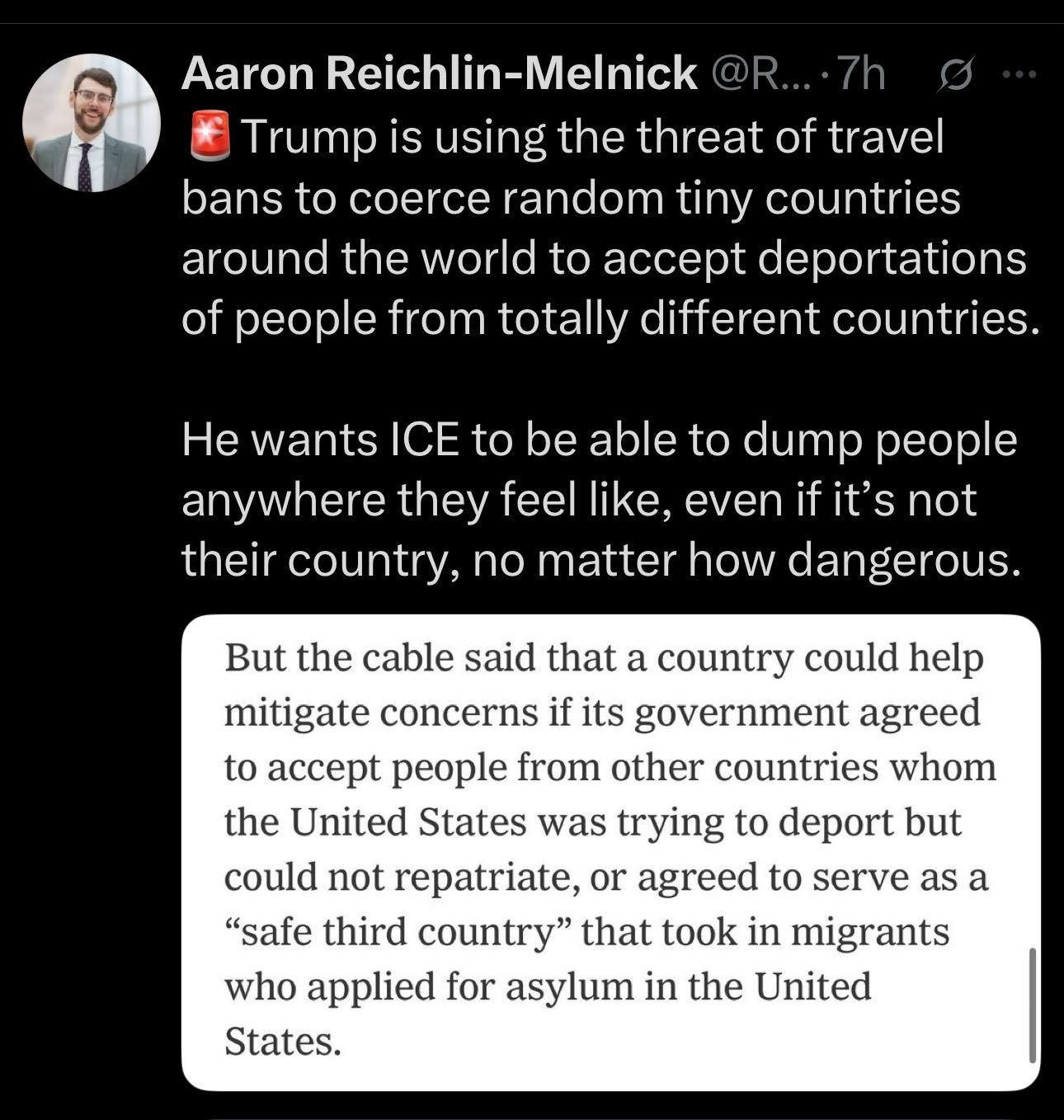Lightning Speed
A new ruling helps preserve Trump's use of the Alien Enemies Act, as his plans to expand beyond CECOT pick up speed.
June 20, 2025
I believe in holidays, even if I don’t get paid holidays, and I believe in Juneteenth, so yesterday, I took my fifth day off.
Today, I am back, and so is the Alien Enemies Act. A district judge in Pennsylvania issued a 15-page ruling in the case of a Venezuelan man facing deportation, possibly to CECOT. The ruling found that the government must provide notice to people detained for deportation under the Alien Enemies act 21 days before their removal. At the same time, she denied the man’s request that the government be prevented from moving him to a different location outside the state.
Three weeks is, as The Disappeared put it, “lightning speed” to mount a challenge to one’s deportation. Upon being detained and informed of their deportation, immigrants must find an attorney to take their case, meet to discuss the details and file a habeas petition in a matter of days.
The fact that a person can be detained and moved to another state – Louisiana seems to be a preferred location – makes this timeframe well nigh impossible. Either loved ones would have to realize what has happened, find a lawyer, determine where the person is being held and ensure that they have representation able to practice there, or the detainee would have to find a way to identify a lawyer locally and get their own habeas petition in motion. These steps would presumably add days of delay, especially given that the government has been inconsistent in sharing information and in allowing detainees to call family or legal advocates.
This follows a ruling in another case this month that found that the rendition of Venezuelan men to El Salvador violated their due process rights, and ordered the government to develop a plan to enable them to contest their deportation and imprisonment in the CECOT mega-prison. That ruling focused on the lack of prior notice for the men, who were thought to be on a flight to Venezuela until it diverted to El Salvador. The new ruling fills in the gap looking forward by requiring such notice, even if that notice is an unrealistically short timeframe.
The two rulings get us closer to clarity on what the law will and will not allow in terms of deportations and due process. It remains to be seen if the three week rule will stand, or if someone will find a way to challenge it, or whether the idea that the Alien Enemies Act will stand as it is applied to this non-invasion.
Meanwhile, plans for an American Gulag continue. Last week, the Administration announced that it is considering travel bans on an additional 36 countries. Aaron Reichlin-Melnick, a Senior Fellow at the American Immigration Council, reports that this may be a pretext for negotiating deportation agreements:
This is in keeping with other actions and reported actions, including the deportation of a group of largely Southeast Asian immigrants to South Sudan, an earlier attempt to send deportees to Libya, and talks about an arrangement with Rwanda, which had earlier been in discussions with the UK about a plan to send asylum seekers out of Britain to Rwanda while their claims were assessed.
Plans for rendering deportees to third countries face a new challenge, however. Yesterday, the Venezuelan NGO La Fundación El Amparo announced that it will file two suits against El Salvador challenging their imprisonment of Venezuelan nationals under the agreement Nayib Bukele made with Donald Trump. The group is filing a motion for “precautionary measures” with the Inter-American Commission on Human Rights, the judicial arm of the Organization of American States. Precautionary measures would require the government of El Salvador to take steps to protect the human rights of the plaintiffs, presumably requiring their release and repatriation. The IACHR has no power to compel action by the government, and it is often ignored. But it would establish a record of wrongdoing.
The other case is possibly stronger stuff. In a virtual press conference, the head of El Amparo said “We will go to the International Criminal Court, based in The Hague, to hold Bukele and his chain of command personally accountable for these arbitrary detentions.”
This follows earlier analysis by political scientist R. Charli Carpenter, soon after the men were sent to CECOT, that the case could constitute a “serious crime” subject to ICC jurisdiction:
forcible transfers of this type are not just human rights violations: When systematic and widespread, they become crimes against humanity punishable by individual criminal prosecution. And while the U.S. is not a party to the ICC, the nature of these acts—which involve cross-border transfers to a state that is a member—creates an avenue by which Trump and others could be indicted by the court.
The facts of the case suggest, according to the author, that the men were subject to “arbitrary detention” as well as “enforced disappearance” and “forcible transfer,” meaning displacement or deportation on grounds impermissible under international law. While the U.S. is not a party to the ICC, the argument continues, “the calculus can change depending on the ratification status of the receiving state,” as with the forcible transfer of Rohingya refugees across the Myanmar-Bangladesh border.
An ICC complaint is not a swift challenge with results that by any human measure count as undoing the injustice that has been done, it would be a high profile means of highlighting the abusive nature of the plan, and it would also create a potentially powerful disincentive to future governments seeking to use this habeas corpus workaround. A case that put Donald Trump and Stephen Miller in the dock would, all the more so.
Could the ICC case filed against Bukele be expanded to include the architects of these brutal renditions? Possibly.




